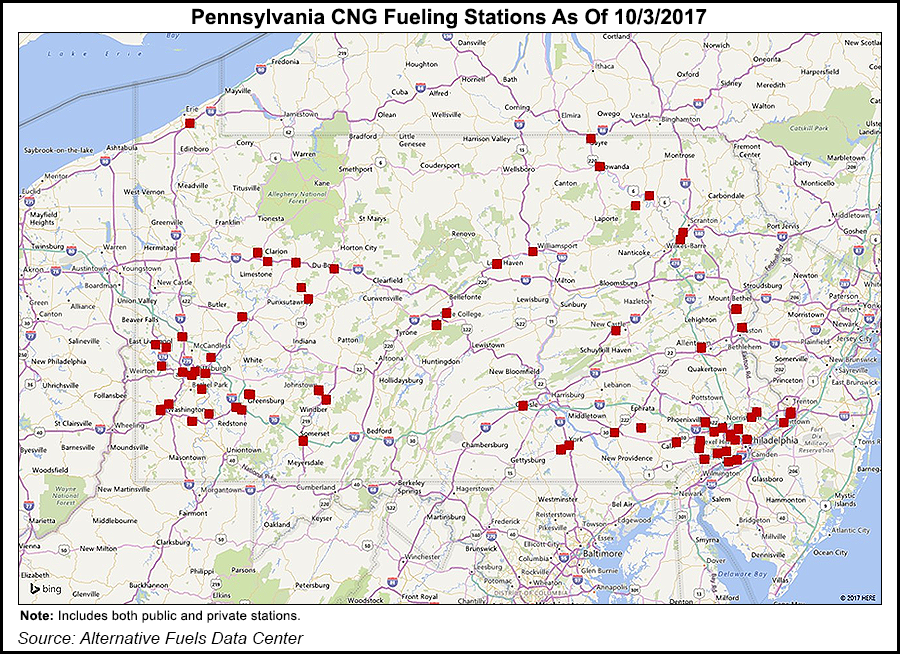NGI The Weekly Gas Market Report | Infrastructure | NGI All News Access
Pennsylvania Continues Expansion of CNG Fueling Station Network
Committed to expand the natural gas vehicle (NGV) sector statewide, Pennsylvania opened a compressed natural gas (CNG) fueling station last Friday as part of its public-private initiative to eventually create a network of 29 stations.

Opened in Aliquippa, PA, the station was developed by Trillium CNG for the Beaver County Transit Agency with the support of local officials and the Pennsylvania Department of Transportation (PennDOT). Gov. Tom Wolf touted the opening as a testament to the state’s $84.5 million P3 CNG program for helping public transit organizations make the switch to natural gas fueling. Pennsylvania now has seven CNG fueling stations.
Under the P3 program, Trillium is designing, building, financing, operating and maintaining the 29 envisioned public transit CNG stations through 20-year contracts. State officials indicated that the rest of the stations will be built during the next five years.
Trillium also is making CNG-related upgrades to existing public transit maintenance facilities. In Beaver County, the transit agency is converting 23 diesel buses and 28 paratransit buses to run on CNG. The transit agency estimates is will save more than $400,000 on it annual 450,000 gallon diesel fuel bill.
PennDOT’s P3 project makes CNG fueling available to the public at transit agency sites and includes expansion options at each site. The agency receives a 15% royalty, excluding taxes, for each gallon of fuel sold to the public. The P3 procurement mechanism allows PennDOT to install the fueling stations faster than if a traditional procurement mechanism were used for each site, state officials said. They estimate capital cost savings in P3 exceed $46 million.
In four other states, Clean Energy Fuels Corp. said it has signed NGV fueling agreements with U.S. Postal Service (USPS) contract carrier fleets in Florida, New York, Oklahoma and Texas, increasing to 15 the number of USPS contract carriers to which it is supplying natural gas transportation fuel. Clean Energy inked fueling contracts with C. Blackburn Trucking Associates, G&P Trucking, Thunder Ridge Transport, and Florida-based Postal Fleet Services, one of the largest USPS carriers. USPS contract carrier fleets have increased their use of alternative fuels by 141% since 2005.
Under the new contracts, Blackburn Trucking will fuel four of its Class-8 heavy-duty trucks at Clean Energy’s station at New York City’s Kennedy International Airport; Missouri-based G&P Trucking will fuel at Clean Energy’s CNG station at the Will Rogers Airport in Oklahoma City; Thunder Ridge, a 150-truck carrier servicing 13 states from its Missouri base, will fuel 20 new CNG trucks out of Clean Energy’s Dallas-Fort Worth station; and Postal Fleet will add additional CNG trucks to its fleets fueling in Texas and Florida.
Globally, Italy-based NGV truck manufacturer Iveco has secured the largest deal ever for its Stralis NP model, selling 500 LNG-powered trucks to pan-European transport/logistics firm the Jost Group. A unit of multi-national CNH Industrial NV, Iveco said the latest Stralis model is designed to be the most sustainable long-distance heavy-duty truck it has ever made.
The first 150 trucks will be in operation next year, with the full fleet of new trucks in service by 2020, an Iveco spokesperson said. The Stralis trucks will replace four- and five-year-old diesel-fueled trucks in the Jost fleet of 1,400 trucks and 3,000 trailers. Jost already operates 132 Stralis NGVs, including two running on CNG, the spokesperson said. “The new LNG trucks will offer an excellent power-to-weight ratio, power density, and quietness of operation.”
In North America, Cenergy Solutions is now offering an adsorbent system for capturing, storing, transporting and using biomethane, or renewable natural gas (RNG). Cenergy is touting its adsorbent natural gas (ANG)/ as a way for farms, communities and businesses to put biogas to good use with a low-pressure storage/fueling system.
Two years ago, California-based Cenergy introduced the system as oneof two technology advances for the use of ANG fuel tanks in NGVs by installing it in a commercial fleet van. The ANG technology allows gas to be stored at far lower pressures than those needed for CNG, which in turn lowers operating costs and allows noncylindrical-shaped fuel tanks to be used.
A new milestone was set in the California Air Resources Board certification of low-NOx fuels with RNG from Amp Americas Indiana-based Fair Oaks Farms dairy waste-to-vehicle fuel gaining a negative score compared to scores on the carbon-intensity scale for other fuels.
© 2024 Natural Gas Intelligence. All rights reserved.
ISSN © 1532-1231 | ISSN © 2577-9877 | ISSN © 1532-1266 |
